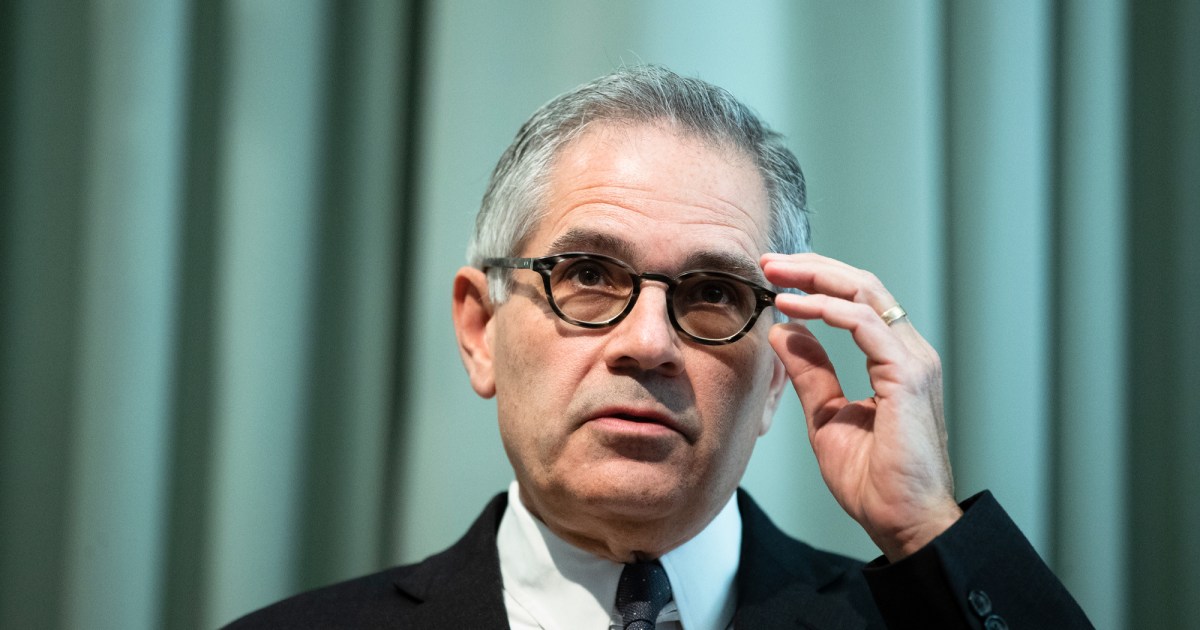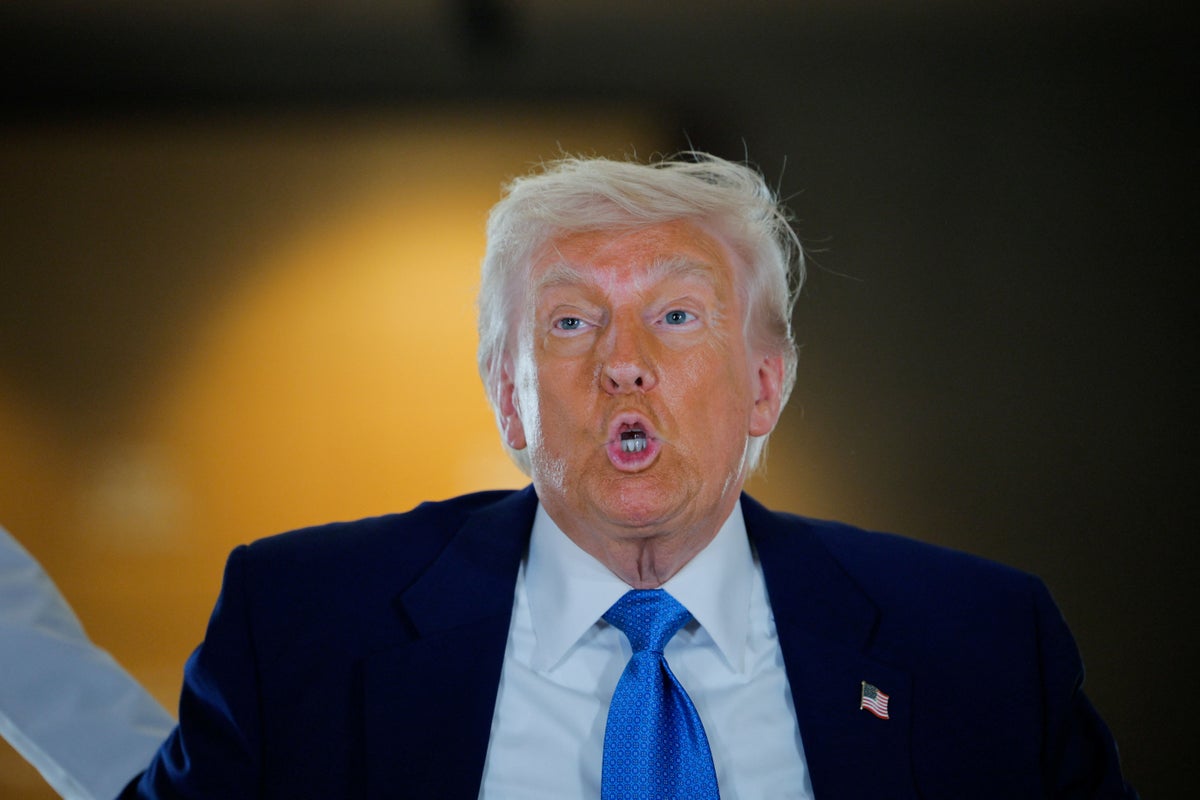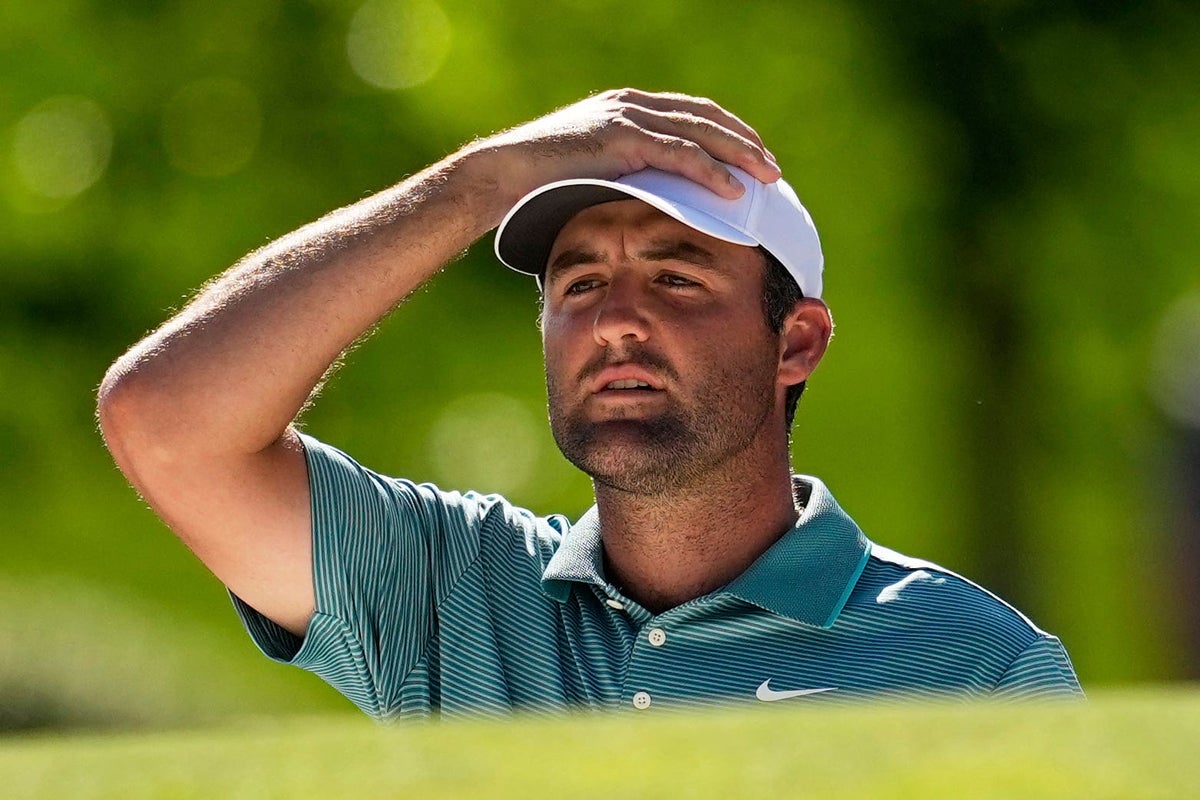Last November, Philadelphia District Attorney Larry Krasner issued a characteristically blunt warning to anyone hatching plans to “play militia,” threaten voters, or otherwise interfere in the upcoming election: “F around and find out.”
“You can have your fun in a jail cell, ’cause that’s what’s coming,” he said in a press conference that went viral on social media. The next day, Krasner downplayed it—“to everyone’s surprise, [I’m] getting a lot of attention”—but displayed a T-shirt that staff members had printed with an acronym: FAFO.
In Philadelphia, where the unbridled aggression of local sports fans is a point of pride, Krasner’s combativeness has been a political asset. In 2017, as a long-shot candidate to be district attorney, Krasner made waves by proclaiming law enforcement to be “systemically racist.” With no prosecutorial experience, he campaigned on his career as a civil rights attorney, having sued the Philadelphia Police Department about 75 times.
Soon after taking office, Krasner instituted sweeping policy changes and oversaw an exodus of prosecutors. He was mostly impervious to criticism from judges, the police union, local politicians, and those ousted from his office. Apparently reveling in open conflict with other public figures, he has nursed a yearslong feud with the more moderate Democratic Pennsylvania Gov. Josh Shapiro and traded barbs with President Donald Trump.
Krasner has exemplified a particularly antagonistic, burn-it-all-down approach to criminal justice reform. Even after eight years in office, he still sees himself as an outsider and as “more a voter than a politician.” During his tenure, he transformed the office of the district attorney—a local law enforcement position—into a national bully pulpit. Krasner has, “in many ways, come to define the progressive prosecutor movement,” said Chesa Boudin, the former San Francisco District Attorney.
But that movement is on its back foot. Efforts to tie criminal justice reform to crime and public disorder have brought down high-profile progressive prosecutors around the country—like Boudin and Los Angeles’ George Gascón. Though there are plenty of reformers still in office, many of whom are opting to keep their heads down, the idealism and enthusiasm have faded since 2020. Lara Bazelon, a law professor at the University of San Francisco, said that the movement is “in the wilderness.”
“It’s hard to convince progressives to run, knowing what has happened to the people who ran before,” Bazelon said. “There’s a problem with recruitment, momentum, and messaging.”
But Krasner sees a new opportunity for the progressive prosecutor under the second Trump administration. Though criminal justice reform has slid down the list of Democratic priorities, he argues that prosecutors still have a role to play in resisting the president. Krasner is now running for his third term—the Democratic primary is on May 20—and often seems to be more focused on Trump than on his opponent, retired municipal judge Patrick Dugan.
“This election is a whole lot bigger than what happens in Philadelphia,” Krasner said while announcing his reelection campaign in February. “DA has come to have a new meaning that I never expected in the last seven years—and that is Democracy Advocate.”
In a political era characterized by melodrama and bluster, it can be hard to tell the difference between grandstanding and, well, taking an actual stand. Krasner admitted that there are limitations to what any local prosecutor can do to resist the federal government, telling me that it primarily comes down to “showing some level of courage.” Krasner has described Trump as a “wannabe dictator surrounded by wannabe oligarchs” and the administration’s immigration crackdown as “Nazi stuff.” To the growing chorus of Democratic voices calling for more vehement opposition to Trump, it may be refreshing to see someone taking a big swing.
Krasner used to say he’d retire after his tenure as district attorney, but now, he’s not so sure. “I don’t have any plans,” Krasner told me. “But I do get a little irritated when elected officials in higher office open their mouths, and I hear clucking coming out.”
In April, I visited Krasner at his home, which doubles as his campaign headquarters, in Center City, Philadelphia. He was attempting to eat lunch while dodging the persistent efforts of a cat hoping to snag a piece of chicken. When an aide offered to move the cat to another room, Krasner waved him off.
Krasner is trim, silver-haired, and usually wears a dark suit and horn-rimmed glasses. He has a languid way of speaking off the campaign trail and has retained traces of a Southern drawl, likely from spending his early childhood in St. Louis. But there is an ever-present intensity to him, as if he is lying in wait for his moment to strike. It is easy to see that he was an effective and relentless litigator.
A graduate of Stanford Law School, Krasner began his career in the Philadelphia public defender’s office before going into private practice as a criminal defense and civil rights attorney. “I really miss the courtroom,” he told me recently. “I truly enjoyed cross-examination, trying cases.” He represented a slew of protesters, often for free, including those arrested during the 2000 Republican National Convention and members of Occupy and Black Lives Matter. “He developed a reputation as an activist lawyer,” said Michael Coard, an attorney in the city and friend of Krasner’s.
Mass incarceration has profoundly affected Philadelphia, with a population that is over 40 percent Black. In 2017, it had the highest incarceration rate of the country’s 10 largest cities. That year, it also led in probation and parole rates among major cities: A Philadelphia Inquirer analysis found that 1 in 23 adults were under some kind of court-ordered supervision.
In the 30 years that Krasner spent as a defense lawyer, he faced off with a district attorney’s office that he has described as punitive to an extreme and accused of turning a blind eye to police misconduct. Philadelphia’s longest-serving district attorney, Lynne Abraham, famously said that she was “passionate” about the death penalty and secured 108 capital sentences during her time in office from 1991 to 2010. In his memoir, Krasner wrote that being a defense attorney felt like “standing outside the DA’s office, banging my head against the wall.”
By 2016, several prosecutors around the country—from Baltimore, Maryland, to Corpus Christi, Texas—were ousted by candidates promising to reform the criminal justice system. A series of high-profile police killings had also drawn newfound attention to racial inequities in law enforcement. Kim Foxx was elected as Chicago’s top prosecutor amid outrage over how her predecessor handled the case of Laquan McDonald, who was shot and killed by police. There was growing support among criminal justice advocates and legal scholars to use the office of the chief prosecutor, historically a primary agent of mass incarceration, to curb it.
When Krasner entered the 2017 Democratic primary, five of his opponents had worked in the district attorney’s office, and one had been a judge. Krasner was initially attacked for his lack of prosecutorial experience, but as the race unfolded, this turned out to be an advantage. Trump was in office, and voters were eager to embrace a left-leaning candidate with a strong position on racial justice. After one debate, the lawyer who had moderated it told the Atlantic, “It sounds like they’re all running for public defender.” Krasner won both the primary and the general election decisively, buoyed by the support of criminal justice organizers and $1.4 million from a George Soros-funded PAC.
But the hard part had just begun. Krasner inherited an entrenched and insular office of about 300 lawyers. The long-standing practice had been to recruit prosecutors from the same local law schools and many, he said, had gone to high school together. Four days into his first term, Krasner fired 31 prosecutors, some of whom had spent decades in the office. Krasner told me that it was essential to reshaping the culture and, in retrospect, he “should have fired more.”
He overhauled office policies, instructing prosecutors to stop pursuing marijuana possession and prostitution charges, reduce or eliminate probation when possible, and seek lenient sentences in most cases. Krasner also ended the use of cash bail in many non-violent low-level offenses. It sent a clear message to those who remained: adapt or leave. Many prosecutors opted to leave, some for jobs at the state attorney general’s office, then led by Josh Shapiro. (At the time, Krasner joked that they were “war criminals” fleeing for Paraguay.)
But Krasner was still moving too slowly for some. At the beginning of his term, he regularly met with a group of criminal justice advocates who had supported his campaign. But the arrangement fizzled out as organizers grew frustrated that the office was still frequently seeking high bail in misdemeanor cases. Candace McKinley, who leads the Philadelphia Community Bail Fund, saw the meetings as a “PR thing” rather than an effort to earnestly engage with concerns.
Pennsylvania state Rep. Rick Krajewski, a criminal justice organizer at the time, explained that some activists had underestimated the pace of reform. “It can be hard to balance your urgency with the patience required to actually understand how the system works,” Krajewski said.
Chief prosecutors are often described as ruling over their personal fiefdoms, and they have an almost unchecked ability to set policy in their own offices. But they still must work with—or around—the myriad of other players in the criminal justice system. Krasner faced considerable resistance from important stakeholders. There were reports that judges had criticized assistant district attorneys for being too lenient, and some rejected new deals that prosecutors had offered to people sentenced to life in prison as minors. Krasner also drew the ire of the local Fraternal Order of Police when he expanded his predecessor’s “do not call” list of police officers with a history of misconduct and filed charges against eight officers during his first nine months in office.
Krasner’s approach stood out even among his fellow progressive prosecutors. Brooklyn District Attorney Eric Gonzalez, who was elected in the same year, had spent 20 years rising in the ranks of his office. Gonzalez had a quieter, more incremental theory of change. In her 2019 book, Charged: The New Movement to Transform American Prosecution and End Mass Incarceration, journalist Emily Bazelon described Gonzalez as a “consensus-builder” and wrote that he “wanted to be a force for evolution, not revolution.”
In some ways, Gonzalez had a different task before him. His predecessor, Ken Thompson, had made the Brooklyn district attorney’s office one of the most progressive in the nation. “Other offices might need a firebrand to come in and blow up the culture,” John Pfaff, a Fordham University law professor, said. “It’s not a question of which is the right approach. It’s a question of, for a given county, which is the best response?”
Slow and steady also wasn’t in Krasner’s nature. He had built a career as an outside agitator and held onto that identity even after being elected. Krasner was not always willing to engage in the diplomacy required of local politics, which could be a source of frustration both inside and outside of his office.
One political ally told me that Krasner sometimes couldn’t stop himself from criticizing public officials despite needing their support. “When you want people to work with you, you don’t start by saying ‘you’re shitty,’” she said.
For Krasner, though, these political skirmishes were more motivated by “truth-telling than fighting for fighting’s sake.” Those who have worked with Krasner say that, during his time in office, he has grown more accommodating—if reluctantly.
“As I get older, I do recognize that sometimes you really ought to say, ‘wow, you look great today’ to someone who doesn’t,” Krasner told me. “But I don’t like it.”
Whether you chalk it up to stubbornness or conviction, Krasner is well-suited to face off with the fervent opposition that progressive prosecutors face. “Larry’s personality makes him immune to some of that pressure,” a former staffer in the district attorney’s office told me. “He has so much more tolerance for conflict than other people do.”
“Larry’s personality makes him immune to some of that pressure. He has so much more tolerance for conflict than other people do.”
Critics have argued that progressive prosecutors across the country have neglected public safety and abandoned law enforcement. In 2022, Virginia Attorney General Jason Miyares advised Republican lawmakers to make progressive prosecutors “the face of Democrats on police and crime.” That year, Republican state legislators unsuccessfully tried to impeach Krasner, arguing that he was selectively enforcing laws and endangering constituents. In 2024, the Republican-led House Judiciary Committee traveled to Philadelphia to hold a hearing focused on Krasner’s “pro-criminal policies.”
Rebecca Goldstein, a law professor at the University of California, Berkeley, said that much of the pushback against reform DAs is “toplash” from state-level officials, particularly Republicans, who have tried to rein them in or remove them from office. Despite some high-profile losses—such as in San Francisco, Oakland, and Los Angeles—progressive prosecutors tend to win reelection, Goldstein said.
This held true for Krasner, who was reelected in 2021 by a wide margin. He was insulated by the geographic boundaries of Philadelphia, which contain fewer suburbs than other major urban areas. And in a majority-minority city, concerns about public safety may be equally weighed with concerns about systemic racism.
“People want to feel safe, but they also want to make sure that their child is not wrongfully criminalized because they’re Black and brown,” former City Council member Maria Quiñones-Sánchez told me. “Those families know that at the end of the day, Larry would, at minimum, give them a fair process.”
How does one measure the success of a progressive prosecutor? Krasner has charted his tenure on two metrics, arguing that he has made the city both “safer and freer.” The DA’s office tracks all prison and jail sentences imposed each year, and Krasner says that future years of incarceration have decreased by around 50 percent, as compared to the previous administration. Last year, Philadelphia saw its lowest homicide rate in a decade, and, this April, its jail population also dropped to a 10-year low.
In late March, Krasner’s campaign commissioned a poll that showed him with a 37-point lead among likely primary voters. Remarkably, the poll also found that 40 percent of voters thought that violent crime in the city was decreasing and 32 percent thought it was staying the same—which the pollster described as “very very unusual.” Nationally, the majority of Americans think that crime is getting worse, even when data shows otherwise.
The upcoming primary will be the true measure of what voters think of Krasner’s policies. His opponent, retired municipal judge Patrick Dugan, is trying to strike a moderating tone and argues that, though the system needs reform, Krasner has gone too far. Dugan is hoping to convince voters that Krasner has mismanaged his office and failed to hold criminals accountable, calling him a “far off the left non-prosecutor.” (The campaign declined to make Dugan available for an interview.)
Though Dugan’s campaign has insisted that he is not the “tough-on-crime” candidate, he has a habit of defaulting to that kind of rhetoric. In April, I watched him speak at a candidate’s forum in the basement of a Southwest Philadelphia library. He appealed to nostalgia for a mostly mythical time when you could leave your door unlocked at night, asking the audience, “Do you let your kids go to the playground in this neighborhood? Do you let them go to the corner store anymore?”
He jabbed his finger. “Do you feel safe?”
Dugan has tried to impress upon voters that Krasner is more interested in courting national attention than fulfilling his duties as chief prosecutor. At the forum, Dugan argued that Krasner pivoted to the president to avoid answering questions about his own record, saying that it was as if Krasner was “running against Trump.”
When we spoke in April, Krasner told me that he’s merely meeting the moment. He called the Trump administration’s mass deportation efforts a “public safety disaster” and argued that it was crucial for prosecutors to resist it, though their jurisdiction is admittedly narrow.
“Are we allowed to get in the way of lawful activity by ICE agents? No, nor should we,” Krasner said. “But we are allowed to prosecute ICE agents if they decide that they’re having so much fun that they’re going to start punching people gratuitously.”
Krasner has also signaled that he may be willing to take some unorthodox approaches. Last October, he unsuccessfully sued Elon Musk over his $1 million giveaway to swing state voters. And in January, he told NPR that he was looking into bringing state charges against Pennsylvanians who received pardons for their role in the January 6 riot.
All this goading may eventually trigger a crackdown. Recently, the Department of Justice announced that it was investigating the district attorney’s office in Hennepin County, Minnesota, for “illegal consideration of race in its prosecutorial decision-making.” Krasner is almost certainly on the administration’s radar, given that Trump called him the “worst district attorney” in 2019.
But this is unlikely to stop Krasner. “Why exactly are we all afraid?” he asked me in March. He certainly doesn’t seem to be. In fact, he seems to be trawling for another fight with Trump. Krasner’s campaign T-shirts have repurposed an old message, this time seemingly targeted towards the president. At his campaign launch, Krasner showed one off while grinning for the cameras. Its slogan read, “F*** AROUND AND FIND OUT.”















